I remember the first few weeks of the ongoing genocide in Gaza. I lost weight and I couldn’t take care of myself or my baby. Being far away in Canada, I couldn’t close my eyes at night out of fear my loved ones in Gaza would be killed while I was asleep. Eventually, they were.
I followed the news closely every day and night. It was shocking (yet also expected) how Western outlets treated information from Israeli sources compared to Palestinian ones. Two different standards for fact-checking.
For instance, major Western outlets like CNN published the now debunked lie that Hamas beheaded Israeli babies in October without evidence from Israeli officials, and others like CBC, the National Post, the Toronto Star, and the Toronto Sun didn’t challenge the lie when it came up in their reporting. Later the same month, the Gaza Health Ministry reported that over 7,000 Palestinians were killed and many of those same outlets instilled doubt in readers about the death toll by including that the ministry is “Hamas-run.” To counter this, the ministry released a list of names of martyrs to prove those numbers were real people.
I know why this is. In my years in the newsroom of a major Canadian news organization, I witnessed the so-called “editorial standards” that work to silence Palestinian voices and uplift Israeli ones. The process of learning about those “standards” was painful and I always felt conflicted about being part of the system. Over time, it became too unethical to stay in.
Behind Western media’s distorted coverage of Israel and Palestine is a mix of deep ignorance, pro-Israel bias, anti-Palestinian racism, white supremacy, and media’s refusal to change. During my years as a video journalist with Global News, I educated my colleagues about Palestine, brought Palestinian voices on air, and provided the company with translation and contextual and historical facts. I tried to bring in change and challenge the biased status quo. But after posting on social media in solidarity with Palestinians in October 2023, I was fired.
Suspecting pro-Israel bias in the newsroom
The first time I sensed that criticism of Israel was taboo in Canadian media was long before October 7, 2023 and long before Israel’s current genocidal assault on Gaza.
In September 2020, the normalization deal between Israel and the United Arab Emirates was announced. I was producing a YouTube video on the deal for Global for which I wrote that the normalization deal “threatens to leave the Palestinians further isolated.”
Normalization deals between Arab countries and Israel imply that Israel’s ongoing occupation and apartheid system against Palestinians are acceptable and that it can build friendly relationships with Arab countries despite all of that. They indeed further isolate the Palestinians and don’t help the cause of freedom and justice for Palestinians, which is why I wrote that line.
According to saved messages, the superior vetting my content told me to remove the word “threatens” because it could be interpreted as “editorializing.” They suggested we do our best to avoid any potential “backlash” especially for stories on Israel and Palestine.
That was the first time I wondered whether such a small margin of freedom to criticize Israel was acceptable to me. I felt like potential pressure from some groups held more importance than my commitment to the truth and to fair coverage.
I tried to bring in change and challenge the pro-Israel status quo. But after posting on social media in solidarity with Palestinians in October 2023, I was fired.
Less than a year later, in April 2021, Israel was pushing to ethnically cleanse around 28 Palestinian families from the East Jerusalem neighborhood of Sheikh Jarrah and have Israeli settlers illegally occupy the area.
A few weeks later, Israel started bombing Gaza in response to warning rockets from Hamas. Only then did Global News – and the rest of Western media – finally cover the story, portraying Israel as the victim of resistance rockets while downplaying Israel’s ethnic cleansing efforts in Sheikh Jarrah. A distorted image of reality.
In protest of the biased narrative, I signed an open letter alongside other journalists to newsroom leaders in Canadian media demanding more nuanced coverage of Palestine. I learned later that some of those journalists were told by their superiors they would be censored from covering Palestine in the future. I was worried I might be next; however, I was dealing with a bigger problem.
I was posting on my social media platforms about the atrocities Israel was committing against Palestinians in Gaza, the West Bank, and Jerusalem. Pro-Israel group HonestReporting Canada (HRC) picked up my tweets and launched a campaign calling on Global News to “address” what HRC called “anti-Israel bias” in my tweets.
Zahraa at a pro-Palestine rally in Toronto. Photo courtesy of author.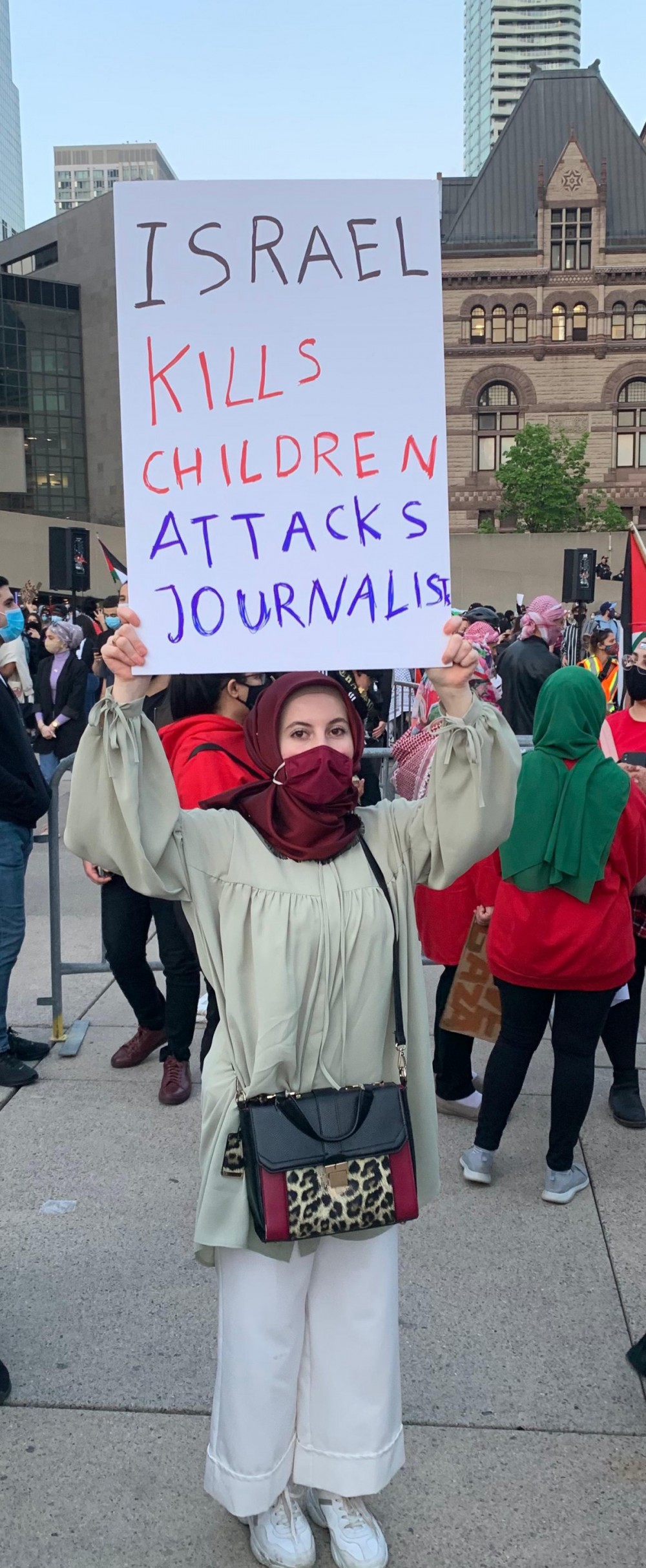
I was disappointed, to say the least. I promised myself that would be the last time I gave in to such pressure.
A year later, on May 11, 2022, Al Jazeera journalist Shireen Abu Akleh was shot by an Israeli sniper while wearing her press vest and helmet when she was covering an Israeli raid on the Jenin refugee camp in the occupied West Bank, according to eyewitnesses.
I was on shift and volunteered to cover the story. I worked on translating the emotional conversation her colleagues had while under fire from Israeli soldiers. I produced a YouTube video and wrote that she was killed by Israel Defense Forces (IDF) fire, citing eyewitness testimonies included in the video.
I ended up walking away from the story due to what Canadian media calls “editorial disagreements” and someone else finished off the script and published the video I worked on. They wrote what I refused to write because it felt unethical to me.
Global’s video, published on May 11, described Abu Akleh’s killing using the passive voice: “Abu Akleh, a veteran journalist working for Al Jazeera, was killed on Wednesday. She was reporting on an Israeli raid into the occupied West Bank when she was shot in the head.” The video then quotes journalist and eyewitness Ali Samoodi who says that “Israeli snipers are to blame,” followed by a summary of a statement from the Israeli government that “it’s impossible to know who fired the shot without examining the fatal bullet, suggesting a joint investigation.”
A subsequent September 2023 United Nations investigation found that “Israeli security forces used lethal force without justification [...] and intentionally or recklessly violated the right to life of Shireen Abu Akleh.”
The day I walked away from covering Abu Akleh’s killing, I vented on my Instagram stories to my followers about how disappointed I was that I couldn’t finish the assignment. I felt that I could no longer accept this small margin of freedom when it comes to covering Palestine and that I had to push for a change, especially after seeing how Canadian media reported on Ukrainian resistance to Russia’s invasion, like including quotes from people calling fighters “heroes.” Meanwhile, outlets shamelessly label pro-Palestine protesters “terrorist supporters.”
Fast forward to October 2023 – I took to my social media platforms to call out Western politicians’ support and media’s impunity for Israel in its attack on Gaza, despite Israel’s Defence Minister’s genocidal rhetoric calling Palestinians “human animals” and ordering a full siege on Gaza, allowing no food, water, fuel, or electricity to enter the city. I was on maternity leave at the time, and not involved in covering the story for Global News. The least I could do was to use my social media platforms for advocacy.
Some of Zahraa’s pro-Palestine social media posts from October 2023.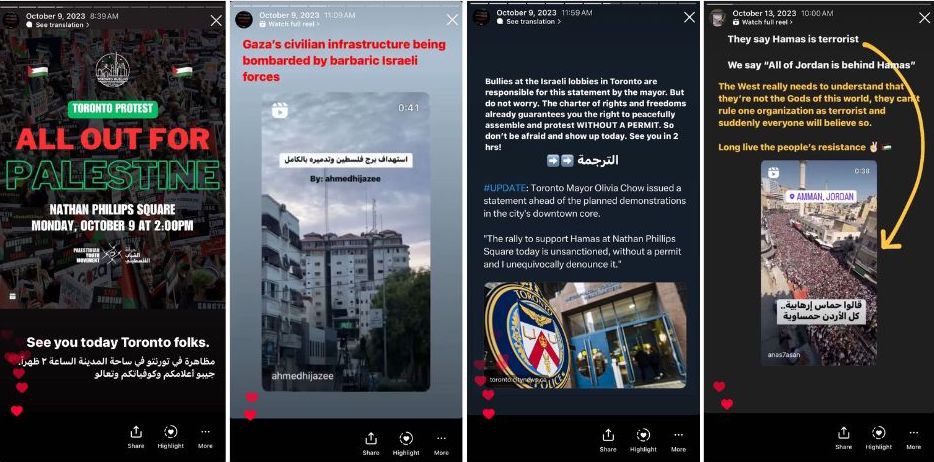
A superior reached out and reminded me of a social media policy that requires all newsroom employees to stay “fair” and “balanced” despite personal views on the situation. They advised me to remove some of my reply tweets and to stop posting “publicly” to my Instagram stories. Reading that email, I understood one thing: I was being asked to remain silent in the face of Israel’s genocidal attack. This time I chose to push back.
I responded with a long email, writing that “I oppose the Israeli occupation of the historical land of Palestine and my beliefs are shared by millions of people around the world, including of Global’s audience […] You might find this [‘partial’] and ‘biased’ but I refuse to be called anything but ‘fair’ to the oppressed people of my country.”
Who decides what’s “fair and balanced” about a genocide? A white middle-aged superior who had the audacity to judge me, a Palestinian with relatives in Gaza, on my ability to tell my own people’s story?
I was then presented with a second – and final – demand to remove social media posts and stop posting in the future. My superior refused to provide a list of posts the company claimed violated their policies. After repeated requests, the superior provided some guidance on the types of posts the company was “very concerned” with: posts with #GazaGenocide, #GazaUnderAttack, and #FreePalestine.
When I read that, my jaw dropped. How can journalism that doesn’t even acknowledge that Gaza is under attack be “fair” and “balanced”?
Less than 24 hours later, Global News fired me while Israel was committing a genocide against Palestinians. Despite the company’s claim that my termination met the threshold for cause, they offered me a five-figure severance in exchange for me signing a document agreeing not to take any legal action for wrongful dismissal or discuss the terms of the severance, among other things. I refused the severance offer, filed a grievance with my union, and went public with my story.
Was I shocked? In one way, yes I was, as a Palestinian, Muslim immigrant who once believed in the values of freedom of speech, diversity, and inclusion in Western institutions. But looking back at the smaller incidents over the years, I think this breakup was inevitable.
“Fair” coverage of a genocide
On the phone call on October 17 in which I was informed of the termination decision, the superior who fired me told me I wasn’t able to communicate in a “fair and balanced” manner in regard to Israel’s attack on Palestinians.
But who decides what’s “fair and balanced” about a genocide? A white middle-aged superior who had the audacity to judge me, a Palestinian with relatives in Gaza, on my ability to tell my own people’s story?
Canadian legacy media treats racialized people like me like tokens. We’re paraded in diversity and inclusion reports, just to be banned from covering the topics that matter most to us. We’re told to take down tweets against genocide. We’re judged to be “too emotional” when a story affects us directly, and, after a few years, we’re pushed out the door.
When it comes to Palestine, journalists are told to remain silent in the name of fairness and balance and not to hold Israel accountable for its recent war crimes in Gaza or 76 years of occupation and apartheid against Palestinians.
What happened to me is a symptom of a deeper problem in Canadian and Western organizations: white supremacy. This pattern of suppressing Palestinian and pro-Palestine voices has been going on for years behind closed doors at Canadian institutions.
This has been a common struggle I’ve heard about from colleagues across Canadian newsrooms. We’re banging our heads against the wall trying to get decision makers in the newsroom to listen to us. They choose not to. Is that fair? Balanced? Ethical?
When Putin invaded Ukraine, Canadian media outlets advocated for Ukrainian sovereignty, supported Ukrainians resisting Putin’s invasion, and called for the freedom of Ukrainians. But when it comes to Palestine, journalists are told to remain silent in the name of fairness and balance and not to hold Israel accountable for its recent war crimes in Gaza or 76 years of occupation and apartheid against Palestinians. My people are not seen as equal. Palestinians are being massacred by the hundreds daily, but Western media says we as people don’t deserve the same “fair” coverage Ukrainians get.
To choose to disregard the genocide and require newsroom journalists to stay silent about it is not only cowardly and unethical, it’s complicity in Israel’s war crimes.
Canadian media is rife with anti-Palestinian bias. Describing the killing of a Palestinian in the passive voice; equating Israel, an occupying force supported by global powers, with besieged Palestinian resistance groups in Gaza; and not decrying Israel’s killing of more than 100 journalists since October 2023 are all biased choices.
This anti-Palestinian bias is proven. An investigation by The Breach found that the largest Canadian newspapers, the National Post, the Globe and Mail, and the Toronto Star, reported on Palestinian and Israeli deaths disproportionately. For all three, “dozens of Palestinian deaths were required to merit just one mention in the newspaper, while there was one mention of Israeli deaths for every two Israelis who died.” In another investigation, they found that CBC uses terms like “murderous,” “vicious,” “brutal,” “massacre,” and “slaughter” to refer to Hamas’ attack on Israelis on October 7, 2023, but describe the Israeli army’s bombing of Palestinians with terms like “intensive,” “unrelenting,” and “punishing.”
These editorial decisions matter. They have the power to change the narrative on Palestine, Palestinian resistance, and Israeli occupation.
“Fair” coverage of what’s going on in Gaza is coverage that calls Israel’s crimes what they are: a genocide.
By pushing journalists who advocate and organize for Palestinians to the side, Canadian and Western media not only fail those journalists – they fail their audience too. They fail in their obligation to hold the oppressor accountable. Most importantly, they fail the over 2 million Palestinians under Israeli bombardment in Gaza since October 2023.
“Fair” coverage of what’s going on in Gaza is coverage that calls Israel’s crimes what they are: a genocide. It’s not that complicated; it only requires a conscience. To choose to disregard the genocide and require newsroom journalists to stay silent about it is not only cowardly and unethical, it’s complicity in Israel’s war crimes.
Silence is complicity. It’s consent. As Nobel Prize winner journalist Maria Ressa says, “we have to actually speak when it matters.” The lives of the more than 30,000 killed Palestinians matter enough for me to speak, no matter the consequences. I only hope Canadian and Western media will see their lives as worthy enough to speak out.
*Global News did not reply to a request for comment.


_copy_1200_675_s_c1_.png)
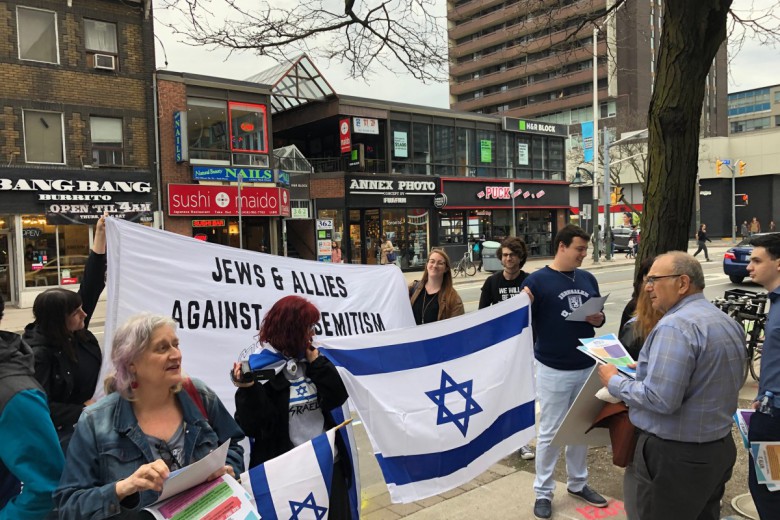
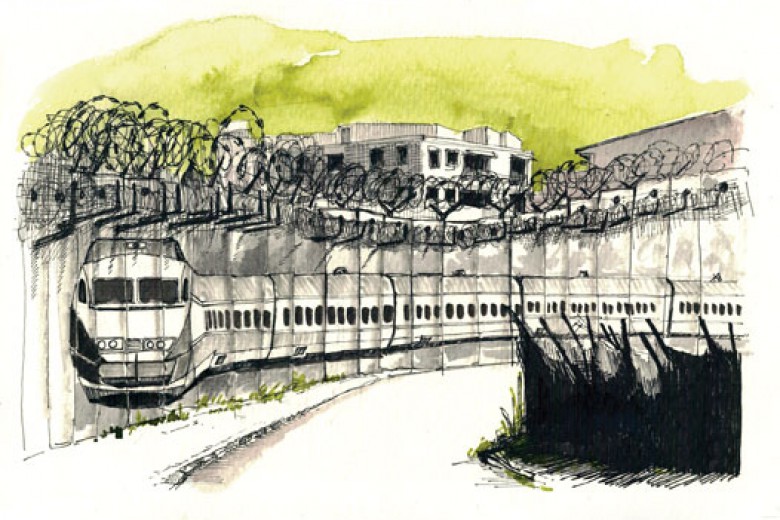
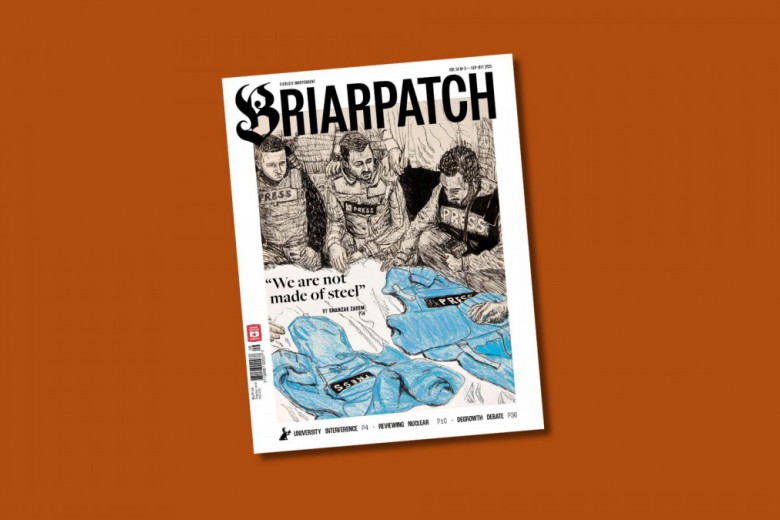
_780_520_90_s_c1.jpg)
